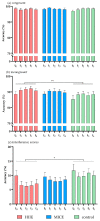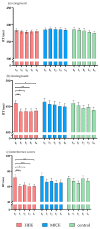Sustained Effects of High-Intensity Interval Exercise and Moderate-Intensity Continuous Exercise on Inhibitory Control
- PMID: 33800004
- PMCID: PMC7967409
- DOI: 10.3390/ijerph18052687
Sustained Effects of High-Intensity Interval Exercise and Moderate-Intensity Continuous Exercise on Inhibitory Control
Abstract
This study examined the immediate and sustained effects of high-intensity interval exercise (HIIE) and moderate-intensity continuous exercise (MICE) bouts on inhibitory control in young adults. Participants (n = 41) engaged in (1) a session of HIIE, involving 10 one-minute runs on a treadmill at an intensity targeting 85-90% HRmax interspersed with self-paced walking at 60% HRmax; (2) a session of MICE, involving a 20 min run on a treadmill at an intensity of 60-70% HRmax; and (3) a control session, involving 24 min of resting on separate days in a counterbalanced order. Using a flanker task, inhibitory control was assessed before the intervention (t0), immediately after the session (t1), and then at 30 min (t2), 60 min (t3), and 90 min (t4) after the session. During the flanker task, the response time (RT) for incongruent trials immediately after HIIE was significantly shortened compared to that before exercise. This shortened RT was sustained for 90 min post-exercise during recovery from HIIE. Interference scores of RT were also reduced after HIIE, benefitting inhibitory control, and were maintained for 90 min post-exercise. Reduced accuracy interference scores were recorded following HIIE compared to the control session. Improvements in inhibitory control elicited by HIIE were sustained for at least 90 min post-exercise. In contrast, an improvement in inhibitory control was not observed during the MICE session. HIIE might represent a time-efficient approach for enhancing inhibitory control.
Keywords: HIIE; MICE; inhibitory control; time course.
Conflict of interest statement
The authors declare no conflict of interest.
Figures



Similar articles
-
Comparison of the Sustainability Effects of High-Intensity Interval Exercise and Moderate-Intensity Continuous Exercise on Cognitive Flexibility.Int J Environ Res Public Health. 2021 Sep 13;18(18):9631. doi: 10.3390/ijerph18189631. Int J Environ Res Public Health. 2021. PMID: 34574554 Free PMC article.
-
The Immediate and Sustained Effects of Moderate-Intensity Continuous Exercise and High-Intensity Interval Exercise on Working Memory.Front Psychol. 2022 Feb 15;13:766679. doi: 10.3389/fpsyg.2022.766679. eCollection 2022. Front Psychol. 2022. PMID: 35242075 Free PMC article.
-
Acute metabolic responses after continuous or interval exercise in post-menopausal women with overweight or obesity.Scand J Med Sci Sports. 2020 Dec;30(12):2352-2363. doi: 10.1111/sms.13814. Epub 2020 Sep 18. Scand J Med Sci Sports. 2020. PMID: 32881054 Clinical Trial.
-
Post-exercise Hypotension Following a Single Bout of High Intensity Interval Exercise vs. a Single Bout of Moderate Intensity Continuous Exercise in Adults With or Without Hypertension: A Systematic Review and Meta-Analysis of Randomized Clinical Trials.Front Physiol. 2021 Jun 28;12:675289. doi: 10.3389/fphys.2021.675289. eCollection 2021. Front Physiol. 2021. PMID: 34262474 Free PMC article.
-
A systematic review and meta-analysis of affective responses to acute high intensity interval exercise compared with continuous moderate- and high-Intensity exercise.Health Psychol Rev. 2021 Dec;15(4):540-573. doi: 10.1080/17437199.2020.1728564. Epub 2020 Feb 25. Health Psychol Rev. 2021. PMID: 32067574
Cited by
-
The influence of physical exercise on adolescents' externalizing problem behaviors: mediating effects of parent-child relationships, self-esteem, and self-control.Front Public Health. 2024 Oct 25;12:1452574. doi: 10.3389/fpubh.2024.1452574. eCollection 2024. Front Public Health. 2024. PMID: 39525468 Free PMC article.
-
Aerobic exercise, an effective intervention for cognitive impairment after ischemic stroke.Front Aging Neurosci. 2025 Apr 4;17:1514271. doi: 10.3389/fnagi.2025.1514271. eCollection 2025. Front Aging Neurosci. 2025. PMID: 40256392 Free PMC article. Review.
-
Physical activity modulates inhibitory control: EEG insights from P300 and theta oscillations.Front Hum Neurosci. 2025 Jun 6;19:1591458. doi: 10.3389/fnhum.2025.1591458. eCollection 2025. Front Hum Neurosci. 2025. PMID: 40547903 Free PMC article.
-
The relationship between physical exercise and mobile phone addiction among Chinese college students: Testing mediation and moderation effects.Front Psychol. 2022 Oct 3;13:1000109. doi: 10.3389/fpsyg.2022.1000109. eCollection 2022. Front Psychol. 2022. PMID: 36262440 Free PMC article.
-
Effects of Acute Exercise on Cognitive Flexibility in Young Adults with Different Levels of Aerobic Fitness.Int J Environ Res Public Health. 2022 Jul 26;19(15):9106. doi: 10.3390/ijerph19159106. Int J Environ Res Public Health. 2022. PMID: 35897486 Free PMC article.
References
-
- Kao S.C., Drollette E.S., Ritondale J.P., Khan N.A., Hillman C.H. The acute effects of high-intensity interval training and moderate-intensity continuous exercise on declarative memory and inhibitory control. Psychol. Sport Exerc. 2018;38:90–99. doi: 10.1016/j.psychsport.2018.05.011. - DOI
-
- Haverkamp B.F., Wiersma R., Vertessen K., van Ewijk H., Oosterlaan J., Hartman E. Effects of physical activity interventions on cognitive outcomes and academic performance in adolescents and young adults: A meta-analysis. J. Sports Sci. 2020;38:2637–2660. doi: 10.1080/02640414.2020.1794763. - DOI - PubMed
Publication types
MeSH terms
LinkOut - more resources
Full Text Sources
Other Literature Sources

